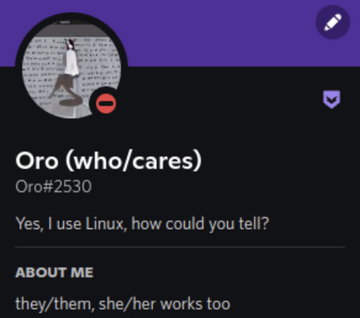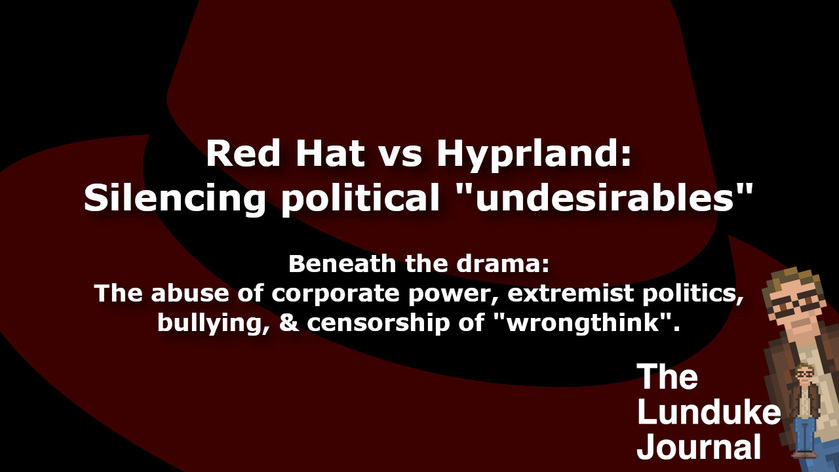The Open Source world is no stranger to drama. Heck, if it's a day that ends in "Ay!", there's likely some random, usually overblown, drama happening in one Open Source organization or another.
But, sometimes, within that drama, there exists a bigger story.
Such is the case with "Red Hat vs Hyprland".
Within this drama there lies a tale of extremist poltiics, abuse of corporate power, and silencing of political "undesirables". The things we learn here -- burried beneath the layers of drama -- are deeply disturbing, with significant ramifications for the entire Open Source industry.
Cutting through the noise
As with all drama, there's a lot of finger pointing. And... noise. So much noise. Let's cut through all of that and get right to the facts.
The basic facts of this event:
- The core developer behind Hyprland (a tiling Linux window manager which has gained significant traction), a man who goes by the name "Vaxry", has been banned from any involvement in the Freedesktop project (an umbrella project covering Xorg, Wayland, and many other core Linux Desktop projects).
- This ban means that Vaxry will not be allowed to report bugs or submit code patches to Freedesktop projects -- often directly relevant to his own work on the Hyprland window manager.
- The ban (affecting Freedesktop) was enacted by a Red Hat representative (using a RedHat.com email address), based on a perceived 2 year old "Code of Conduct Violation" on a Hyprland chat server.
- Red Hat, Freedesktop, and Hyprland are all separate organizations.
As with any drama, there's a great deal of other information out there -- along with frenzied onlookers yelling about it from the sidelines -- but those are the core actions and facts.
The key takeaway: A representative from Red Hat was using corporate power to force a person out of other (read: non-Red Hat) organizations. For reasons not related to Red Hat. Nor related to the organization the person was being banned from.
In essence, Red Hat flexing it's muscle -- bending large portions of the Open Source world to do it's bidding.
By itself, that's bad enough. But it gets worse. Much worse.
What was the "violation"?
In order to understand how truly disturbing this issue is, we need to know a few additional details. Starting with the initial "Code of Conduct Violation".
Back in 2022 -- yes, two years ago -- on the Discord chat server for the Hyprland window manager project, a man who identified as "Trans" listed his preferred prouns as "she/her".
A moderator on that Hyprland chat server changed that "Trans" person's pronouns to list as "who/cares".

Flash forward to 2024, and this "who/cares" action comes to the attention of another man who identifies as "Trans". An employee of Red Hat named Lyude Paul.
To give you an idea of the motivations of the actions which follow: Lyude Paul has a publicly stated goal of "bullying" anyone who does not adequately show respect to "Trans" issues, as shown in his social media posts.

Lyude Paul also promotes the idea that "right-wing people are not welcomed" in organizations.

As Lyude Paul has a stated objective of "bullying" people -- making sure they are "not welcomed" -- if they do not profess the correct political ideals (or do not support "Trans" activism in the proper way)... it is not entirely surprising that this gentleman would use his position at Red Hat to ban those he disagrees with.
And that is exactly what happened.

Lyude Paul -- using his Red Hat email address -- informed Vaxry (the lead developer of Hyprland -- the project where the "who/cares" chat server incident occurred) that he was now banned from the entirety of the Freedesktop project and organization.
An important note: When a person sends an email from their corporate email account, they are acting on behalf of the corporation. That is a hard and fast rule that has been in place since... well... forever. Likewise Red Hat has not distanced itself from these actions in the least.
You can read the full emails, from Lyude Paul / Red Hat, as published by Vaxry.
The Red Hat Problem
This is an example of Red Hat, a corporation with a wild history of discrimination and censorship, using their corporate power (and strength within the Linux and Open Source world) to bully and silence those they politically disagree with.
Red Hat could condemn these actions (which were done in Red Hat's name) by their employee. They have not done so.
None of this should be terribly surprising, considering what we already know about the IBM subsidiary. They have a history of taking extreme political stances... and they actively discriminate against employees who deviate from their allowed, always extremely politically Leftist, ideals.
- Red Hat holds official "Anti-White" training programs.
- Red Hat / IBM employees are given "badges" for being a good "ally".
- Red Hat has a "Word Usage Council" where they actively find words and thoughts to ban.
- Red Hat / IBM has racist hiring quotas and more.
Considering Red Hat's historical stances and actions, it is no surprise that an employee of Red Hat would be able to use the corporate power of Red Hat to bully others who possessed the wrong ideas (as was the publicly stated objective of Lyude Paul).
A singular bit of drama... and a trend.
This particular incident has elicited strong reactions -- and has grabbed the attention of many across the Linux and Open Source industry. Lots of drama. Lots of opportunities to quote people who are making big, outlandish statements.
And most of that drama is little more than distracting fluff.
But the core -- the facts -- are truly disturbing. And, once again, Red Hat finds itself at the center of another story where people are being discriminated against.
A few closing thoughts.
- If this sort of bullying, censorship, and blacklisting of those with the "wrong politics" is allowed to continue... it will get worse.
- Lyude Paul is guilty of far more extreme "Code of Conduct" violations than Vaxry -- as is shown in the screenshots above. Yet Lyude Paul has not been banned, censored, or punished in any way by Red Hat or Freedesktop.
- It would appear fairly obvious that the "Code of Conduct", at least in this case, is being used as a weapon to selectively harm specific individuals.
- Considering Red Hat / IBM's history and dedication to discriminating against specific groups, it seems a fair assumption that these actions are not only allowed but encouraged by corporate leadership. Should that not be the case, The Lunduke Journal encourages Red Hat and IBM to make a statement regarding it. If such a statement is made, The Lunduke Journal will publish it in full.
- Will Open Source organizations -- such as Freedesktop -- allow these sorts of discriminatory actions to continue?
- Should Freedesktop, and others, continue allowing this type of discrimination... what result will that have on existing Open Source projects and users of those projects?
The Lunduke Journal has reached out to representatives from IBM and Red Hat for comment. As of the time of publication The Lunduke Journal has received no response.















